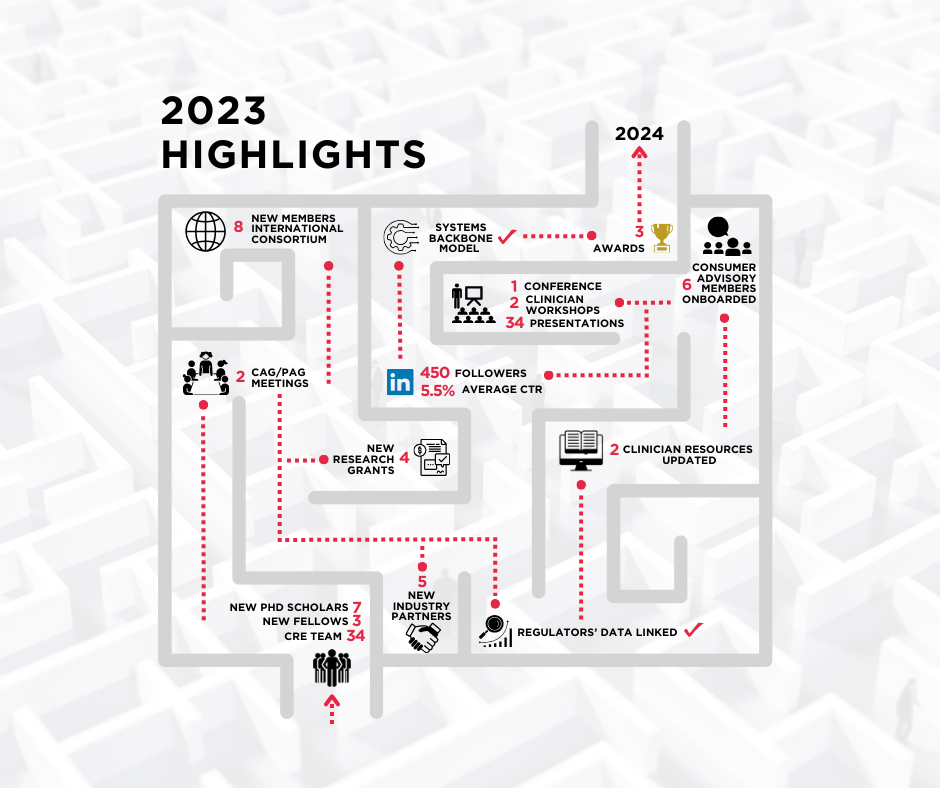Awards
2023
Professor Michele Sterling received Research Australia’s 2023 Health Services Research Award in recognition of her research into traditional physical treatments for people with musculoskeletal road traffic injury.
Research Australia's 2023 Announcement
2025
The implementation of My Whiplash Navigator - our evidence-based online tool to guide recovery after whiplash - project was shortlisted for the “Education and Training Program Design” award at the PIEF Conference's Awards Gala Dinner on 27 October.

Professor Michele Sterling was listed as the top researcher in the field of Pain and Pain Management in The Australian's list of Australia’s top 250 researchers in 2026.
The Australian's 2026 Announcement
2025 Progress
During mid-June, the CRE held a two-day General Meeting meeting, consisting of the Steering Committee and Research Fellows, which provided important input into the direction of our research objectives. We held a roundtable meeting with our Policy and Clinical Advisory Groups, which provided insightful advice on our various research projects and objectives.
On 17 June, over 310 in-person and online delegates attended our Research Symposium at The University of Queensland's Herston Campus, engaging with research and networking with peers from academia, healthcare, insurance, and the community. Highlights can be seen in the video below.
Priority Area 1: Data to drive system change
The team at The University of Melbourne has finsihed the GENSIMO (GENeric Social Insurance MOdelling) platform. GENSIMO predicts recovery trajectories and health outcomes by integrating claims-based systems, client pathways, and actuarial data. In collaboration with the Transport Accident Commission (TAC), a 'Digital Twin' was developed using anonymised TAC claims data to simulate policy scenarios, including: (1) value-based healthcare impacts on costs and recovery, (2) human resource capacity effects on waiting times, (3) client satisfaction and recovery interplay, and (4) cohort effects such as demographics and crash seasonality. This project is a free and open-source software framework for modelling and simulation of social insurance systems.
As you will be able to hear in the podcast summary of the project below, GENSIMO offers several advantages for researchers, policymakers, and practitioners in insurance within compensable injury schemes. These benefits are derived from its generic, flexible design and simulation power, making it a valuable tool for evidence-based decision-making, particularly for: Policy impact analysis, system-wide insights, accessibility and cost-effectiveness, and broader applications in sustainability and transitions.
Priority Area 2: Implementing best-practice models of care
Two of our MRFF clinical trials, PICOT and PRioRTI, commenced participant recruitment in April and July respectively. For PRioRTI, three Emergency Departments (one in Brisbane, two in Sydney) are expected to recruit a considerable number of patients for the randomised controlled trial to prevent chronic pain after whiplash. For PICOT, 36 physiotherapy clinics nationwide have had their physiotherapists complete their training for this implementation trial to integrate psychological and physical care via the StressModex intervention.
Priority Area 3: Reducing the impact of system factors on injured people
The CRE’s Data Linkage team at Monash University completed the Long Compulsory Third Party Claims in New South Wales study, funded by the State Insurance Regulatory Authority (SIRA), identifying key factors associated with prolonged claims (e.g., injury severity, socio-economic influences, and early intervention gaps) and finalising a predictive model to flag at-risk individuals for timely support; initial findings indicate potential reductions in claim durations by up to 20% through targeted insurer interventions, with full results to be published in early 2026. Dissemination workshops were held with SIRA and CTP insurers to share insights from the Long Claims study, focusing on integrating predictive tools into claims processes to minimise administrative burdens on injured people and promote faster recovery pathways.
Evaluation of the My Whiplash Navigator online resource was completed, assessing its integration into Allianz Insurance's claims systems and usage by over 90 claims consultants across SA, QLD, and NSW; results showed high engagement rates (e.g., 75% adoption in training programs) and positive feedback on empowering injured people to navigate compensation processes, with plans for expanded consumer-focused modules in 2026. Media coverage in December 2025 highlighted Allianz Australia's full integration of MyWhiplash Navigator into CTP claims management following the successful pilot, noting key outcomes like a 6.7-point satisfaction increase and over 30,000 platform visits. See articles in Insurance News and Insurance Business.
Other Updates
Our team grew, welcoming 2 new Research Fellows (Dr Nicole Rickerby and Dr Michael Morgan), to equal a total of 10 Research Fellows, 10 PhD scholars, 2 Fellowships, 7 Associate Investigators, and 11 Chief Investigators.
2024 Progress
Our activities continued to gain momentum in 2024, with significant advancements in our research objectives.
The Better Data for Better Outcomes initiative progressed substantially, with data received from seven of eight national and international studies on minor-to-moderate road traffic injury (RTI). The data harmonisation and integration process to create a pooled dataset is advancing rapidly and is expected to be completed by the end of 2024. This will establish the largest research resource for recovery after minor-to-moderate RTI, enabling new analyses to quantify burden of these injuries with broad national and international applicability. Initial analyses will focus on modelling health-related quality of life recovery post-RTI and estimating novel case-based disability weights specific to minor-to-moderate RTI.
The team at the John Walsh Centre for Rehabilitation Research (USYD) and SIRA conducted four information exchange sessions to discuss findings from longitudinal studies of non-catastrophic RTI in NSW, leveraging over a decade of work through the FISH and NCTP studies. Discussions covered: (1) long-term recovery outcomes two years after non-catastrophic RTI, (2) comparisons of self-reported recovery outcomes under NSW CTP schemes (MAIA 2017 legislation vs. MACA 1999 legislation), (3) prognostic factors for long-term recovery outcomes, and (4) claim-related CTP compensation factors impacting long-term recovery. Findings highlight positive impacts from NSW CTP scheme reforms, including immediate statutory benefits, early rehabilitation support, and income assistance, promoting recovery in the initial claim stages.
The CRE’s Data Linkage team at Monash University, funded by SIRA, advanced the Long Compulsory Third Party Claims in New South Wales study. This project uses SIRA CTP claim data to identify factors associated with prolonged claims, developing a predictive model to inform targeted interventions. By identifying at-risk individuals early, SIRA and CTP insurers can implement support to enhance recovery, reduce claim duration, and alleviate burdens on the CTP scheme and society. The project is anticipated to be completed late 2025, with insights disseminated thereafter.
The team at The University of Melbourne has finalised the development of the GENSIMO (GENeric Social Insurance MOdelling). This was showcased at our June symposium and was funded in collaboration with the TAC. GENSIMO is publicly available for other schemes, with publications planned for 2025.
The UQ team progressed two MRFF clinical trials, PICOT and PRioRTI. For PRioRTI, three Emergency Departments (one in Brisbane, two in Sydney) were onboarded to recruit a considerable number of patients each with recruiting starting in early 2025. For PICOT, 30 physiotherapy clinics nationwide are near finalisation for an implementation trial to integrate psychological and physical care via the StressModex intervention. Clinics will receive training (either in‑person or via online modules) in March 2025, followed by patient recruitment.
The teams at USYD and UQ have advanced the My Whiplash Navigator online resource, integrating new interactive case studies into Allianz Insurance's claims system, engaging 90 claims consultants across SA, QLD, and NSW. An implementation study assessed usage by healthcare professionals through APA postgraduate courses and USYD's undergraduate programmes, showing promising engagement metrics. An evaluation in 2025 will assess practical application, with future research focusing on consumer uptake strategies.
One roundtable meeting was held with our Policy and Clinical Advisory Groups, which provided important input into the direction of our research objectives.
Our team grew to a total of 8 Research Fellows, 10 PhD scholars, 2 Fellowships, 7 Associate Investigators, and 11 Chief Investigators.
Over 220 in-person and online delegates attended our Symposium at USYD, engaging with research and networking with peers from academia, healthcare, insurance, and the community.
2023 Progress
Our activities gained momentum in 2023, with many objectives achieved to progress our research.
To identify an injured person's pathway through CTP schemes and rehabilitation systems, we've established new data linkages to produce novel datasets, new projects, and new publications. The design and development of a social insurance platform has enabled the production of the backbone model of an insurance scheme, into which linked data can be uploaded, thereby identifying the pathways of injured people. Protocols are in place to commence a large study of international datasets to characterise the recovery of quality of life after injury and to estimate novel disability weights.
Recruitment for the two new MRFF clinical trials has been completed, enabling commencement in mid-2024. Implementation of improved models of care was achieved through the addition of interactive modules for clinicians in the My Whiplash Navigator online resource, and revision of the Australian Clinical Guidelines for Whiplash Associated Disorders (publicly released in 2024).
Three new patient-centred resources are now being developed and tested, with results likely to be released in 2024.
Two roundtable meetings were held with our Policy and Clinical Advisory Groups, which provided important input into the direction of our research objectives.
Our team was complemented by the addition of 3 new Research Fellows, 7 new PhD scholars (with more expected in 2024), and 8 new members to our International Consortium.
Over 170 in-person and online delegates had the opportunity to learn of unpublished research findings and to network with peers from academia, healthcare, insurance, and the community at our inaugural Symposium held at The University of Queensland (UQ). We hope to welcome you to our 2024 Symposium being held at The University of Sydney (USYD) on 12 June!

